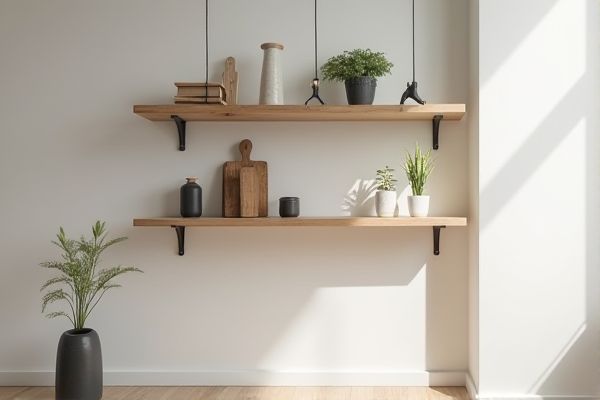
Hanging shelves maximize vertical space and add a modern touch to any room, while corner shelves efficiently utilize often-overlooked corner areas, creating extra storage without occupying much floor space. Discover which shelf type best suits Your space and style by reading the rest of this article.
Table of Comparison
| Feature | Hanging Shelf | Corner Shelf |
|---|---|---|
| Placement | Mounted on walls, typically mid-wall height | Installed in room corners, utilizing corner spaces |
| Space Usage | Maximizes vertical wall space | Optimizes unused corner areas |
| Design | Varies from minimalist to decorative | Usually triangular or L-shaped for corner fit |
| Storage Capacity | Limited by wall length and bracket strength | May hold more items due to multi-tier options |
| Installation | Requires wall anchors or studs | Needs secure corner mounting, often simpler |
| Use Cases | Display books, decor, plants | Ideal for plants, toiletries, decorative items |
| Cost | Generally affordable, varies with material | Affordable, often competitively priced |
Introduction to Hanging Shelves and Corner Shelves
Hanging shelves offer versatile wall storage solutions, ideal for maximizing vertical space in living rooms, kitchens, or offices while creating a clean, modern aesthetic. Corner shelves are specifically designed to utilize often overlooked corner areas, enhancing room functionality by providing additional storage without occupying central wall space. Both shelf types optimize space usage, but hanging shelves emphasize flexibility and visual appeal whereas corner shelves prioritize efficient use of room corners.
Key Differences Between Hanging and Corner Shelves
Hanging shelves are mounted directly on walls, offering versatile placement options and a sleek, modern look, while corner shelves are specifically designed to fit snugly into room corners, maximizing unused space efficiently. Hanging shelves typically support heavier weights and allow for customizable height adjustments, whereas corner shelves provide optimal stability due to their triangular design. Your choice will depend on the room layout and the type of items you need to display or store.
Space-Saving Benefits of Hanging Shelves
Hanging shelves offer significant space-saving benefits by utilizing vertical wall space efficiently, freeing up valuable floor area in any room. Their minimalistic design allows you to maximize storage without overcrowding, making them ideal for small apartments or rooms with limited square footage. Your organization improves as items are elevated, creating a streamlined and clutter-free environment compared to corner shelves that may restrict access or limit usable space.
Space Optimization with Corner Shelves
Corner shelves maximize space by utilizing often overlooked corner areas, making them ideal for small rooms or tight spaces. Hanging shelves, while versatile and stylish, typically occupy flat wall space and may not fully capitalize on room corners. Installing corner shelves enhances room organization and frees up wall space, optimizing overall spatial efficiency.
Aesthetic Appeal: Design Options Compared
Hanging shelves offer sleek, modern designs with clean lines and minimal visual impact, making them ideal for showcasing decor without overwhelming the space. Corner shelves maximize room efficiency by fitting snugly into unused corners, often featuring tiered or curved designs that add dimension and interest to your walls. Your choice depends on whether you prefer the streamlined elegance of hanging shelves or the space-saving functionality and unique shapes of corner shelves.
Installation Process: Hanging Shelf vs Corner Shelf
Hanging shelves typically require mounting brackets or anchors fixed directly into wall studs or drywall, demanding precise measurements and level alignment for secure installation. Corner shelves utilize the natural angle of room corners, often requiring fewer support points and simpler brackets, making them easier and quicker to install in many cases. Both installations benefit from studying wall material and weight capacity to ensure stability and avoid damage.
Durability and Weight Capacity Considerations
Hanging shelves typically offer robust durability and higher weight capacity due to their secure anchoring directly into wall studs, making them ideal for heavy items. Corner shelves, while space-efficient, often have lower weight limits because they rely on fewer mounting points and less wall surface for support. Choosing between the two depends on the specific load requirements and the structural integrity of the installation area.
Best Uses: Ideal Rooms and Applications
Hanging shelves are best suited for living rooms, kitchens, and offices where wall space is abundant, offering versatile storage and display options for books, decor, and utensils. Corner shelves excel in maximizing unused corner spaces in bathrooms, bedrooms, and small apartments, providing compact storage without occupying valuable floor area. Both shelving types enhance organization and aesthetics but are chosen based on room layout and space efficiency needs.
Budget Comparison: Cost-Effectiveness
Hanging shelves typically offer greater cost-effectiveness due to simpler installation and lower material expenses compared to corner shelves, which often require custom fitting and specialized brackets. Corner shelves may provide better space optimization, but they usually come at a higher price point, making them less budget-friendly. Considering your budget, a hanging shelf can deliver functional storage without the added cost of corner-specific designs.
Choosing the Right Shelf for Your Space
Hanging shelves maximize vertical wall space, ideal for rooms with limited floor area and provide a sleek, modern look while supporting lightweight items like decor or books. Corner shelves utilize often overlooked room corners, enhancing storage without disrupting room flow, perfect for displaying plants, photos, or small essentials. Selecting between these depends on wall area availability, load capacity needs, and the desired aesthetic impact within your living space.
 homyna.com
homyna.com